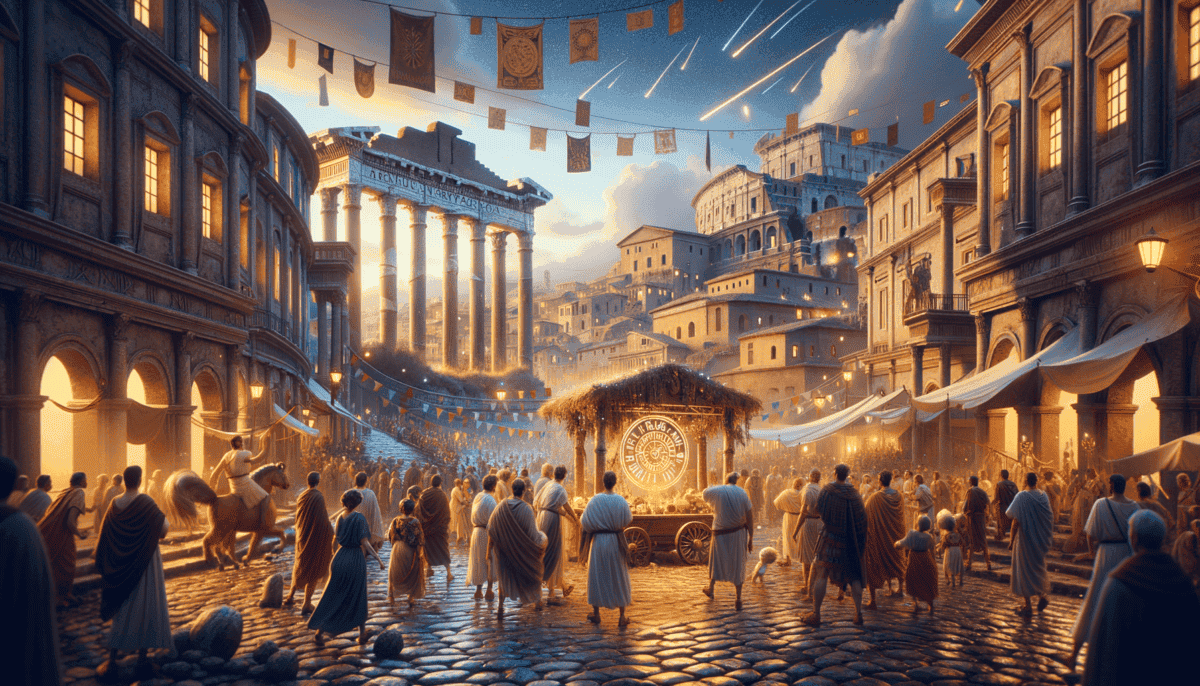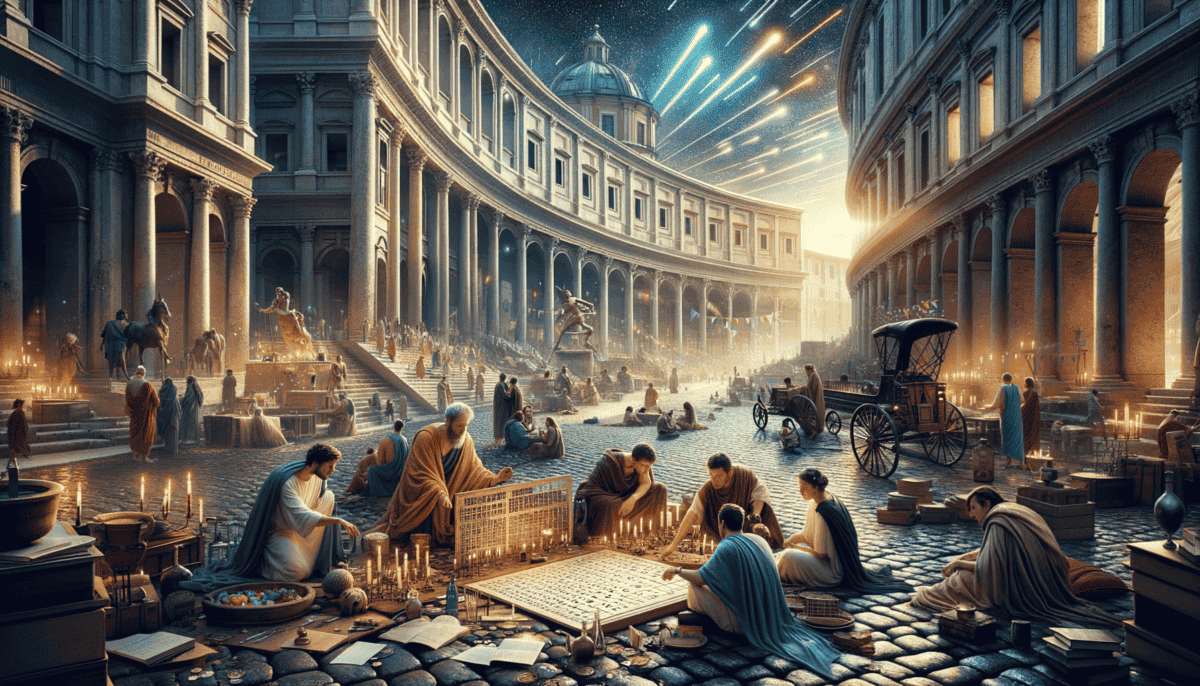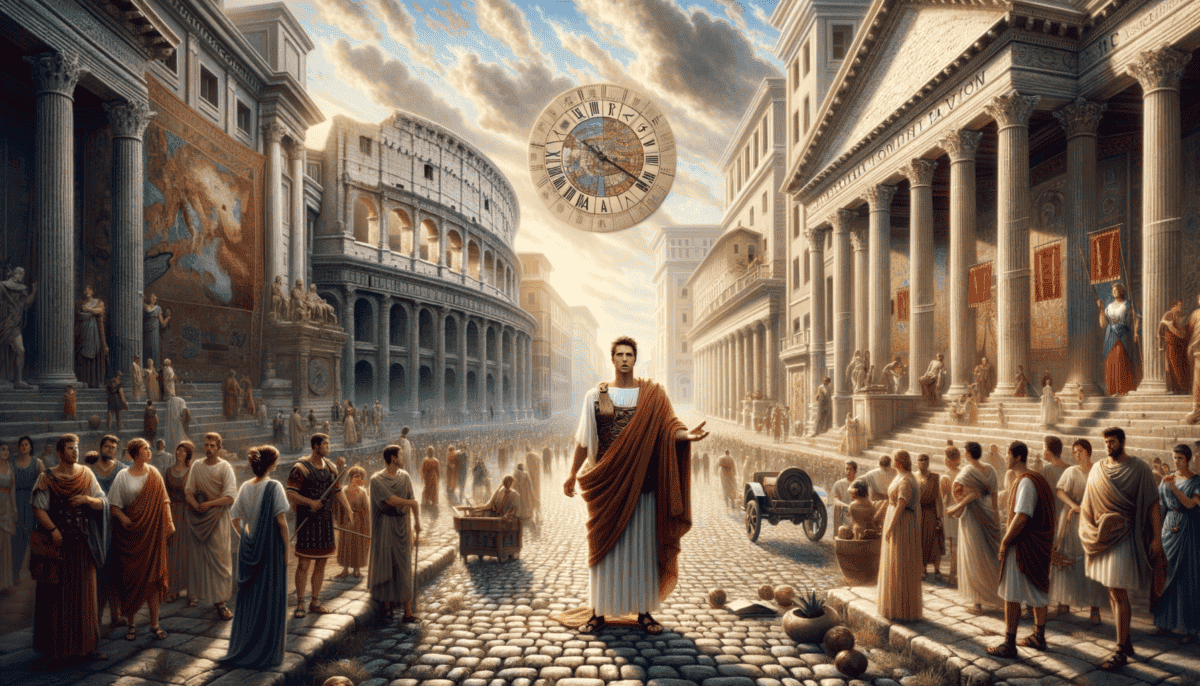A Tale of Two Brothers
Long ago, in a place called Rome, two special baby boys were born. Their names were Romulus and Remus. These twins would grow up to change how we count our days!
"Look at the stars, brother," young Romulus said one night. "They dance across the sky in patterns."
Remus nodded, his eyes twinkling like the stars above. "Just like the moon changes shape each month."
The brothers noticed how the sun and moon moved in the sky. They saw how the seasons changed from hot to cold and back again. This gave Romulus a big idea!
Romulus became the first king of Rome. He wanted to help his people know when to plant crops and when to celebrate special days. So he made the very first Roman calendar!
Here's how Romulus split up the year:
• Martius (March) – Named after Mars, the god of war
• Aprilis (April) – When flowers bloom
• Maius (May) – Named for growth
• Junius (June) – Named after youth
• Quintilis (July) – Fifth month
• Sextilis (August) – Sixth month
• September – Seventh month
• October – Eighth month
• November – Ninth month
• December – Tenth month
“Time is like a river,” Romulus told his people. “We must learn to follow its flow.”
The people of Rome loved their new way of counting days. Farmers used it to know when to plant seeds. Priests used it to plan festivals. Even merchants used it to plan their trips to sell goods.
But there was a problem! The calendar only had 304 days. What about the rest of the year? It was like having a puzzle with missing pieces!
"Something must be done," the people whispered. "Winter days are not counted at all!"
They were right. The cold winter months were just called "winter time" with no real names or counting of days. It was very confusing!
“Our calendar tells us when to plant and when to celebrate. But what about the days when snow covers the ground?” asked a wise old farmer.
The sun set on Rome each evening, painting the sky in beautiful colors. As Romulus watched from his palace, he knew his calendar was just the beginning. Someone would need to make it better someday.
Little did he know that his simple calendar would grow and change over many years. It would become something used by people all around the world!
The stars twinkled above Rome, just as they had on that night long ago when two young brothers watched them dance. The story of time had only just begun…
Sacred Days and Special Names
The sun rose over Rome, casting golden light on temples filled with statues of gods and goddesses. People gathered to celebrate special days marked on their calendar. Each month had its own story to tell! ️
"Tell us about the gods who watch over our months!" children would ask the temple priests.
The wise priest smiled and began to share the special stories. "January is named after Janus, the god with two faces. One face looks back at the old year, and one looks forward to the new year!"
“Janus guards all beginnings and endings. That’s why his month starts our year!” explained the priest.
The children’s eyes grew wide as they learned about Mars, the mighty god of war. His month was March, when armies would start their battles after winter ended. ️
Here are some special celebrations the Romans had:
• Saturnalia in December – A fun party time!
• Floralia in April – To welcome spring flowers
• Vestalia in June – To honor the goddess of home
• Lupercalia in February – For good luck and health
A young girl named Julia watched as her family prepared for a festival. "Mother, why do we celebrate on certain days?" she asked.
"The gods gave us seasons for planting and growing," her mother answered. "Our festivals thank them and mark important times of the year."
“Each month brings its own gifts,” Julia’s mother said. “Like flowers in spring and harvest in fall.”
The Romans watched the sky carefully. They saw how the moon changed shape through each month. This helped them plan their special days.
Farmers knew when to plant seeds by these special days. Sailors watched for storms during certain months. Even merchants planned their travels around festival times!
"The gods dance with the seasons," said an old farmer. "They show us when to work and when to rest."
The calendar became more than just counting days. It was a way to remember stories, honor gods, and bring people together.
As night fell over Rome, temple fires glowed bright. Tomorrow would bring new celebrations, new stories, and new reasons to thank the gods who watched over their months and seasons.
The stars peeked out one by one, just as they had for countless festivals before. But the calendar still wasn’t perfect. Something big would need to change…
Caesar’s Great Calendar Fix
Julius Caesar looked up at the stars one cold night in Rome. Something was wrong with the calendar. The seasons didn’t match up with the months anymore!
“We must fix this,” Caesar said to his friend Sosigenes, who knew all about the stars. “Our farmers don’t know when to plant their crops!”
“The sun takes 365 days to go around Earth,” Sosigenes explained. “But our calendar only has 355 days!”
Caesar wanted to make things right. He worked with smart people who studied the sky. Together, they made a new calendar called the Julian calendar.
“Every month will now have either 30 or 31 days,” Caesar announced. “Except February – it gets 28 days!”
Little Marcus, a boy who lived in Rome, asked his father, “Why do we need an extra day?”
“The Earth’s journey around the sun isn’t exactly 365 days,” his father explained. “It’s a bit longer. The extra day helps keep our calendar matching the seasons.”
Here’s what Caesar changed:
• Added more days to make 365 total
• Fixed when months start and end
• Made leap years every 4 years
• Put January as the first month
People needed time to learn the new calendar. Some were confused at first. “Why did Caesar add so many days?” they wondered.
“Look,” said a wise teacher, pointing to a fruit tree. “Now our calendar matches when fruits grow and when leaves fall. Our festivals will be in the right seasons again!”
The stars seemed to twinkle with approval as Rome’s new calendar helped everyone know exactly what day it was.
Farmers smiled because they could plan their crops better. Sailors could predict storms more easily. Even the priests were happy because festivals would happen at the right times!
As the sun set over Rome that evening, everyone knew something important had happened. Caesar had given them a gift that would last for thousands of years.
“The calendar is fixed,” Caesar said proudly, watching the evening star appear. But even his new calendar wasn’t perfect. Soon, another emperor would want to make his own changes…
️ Augustus Makes His Mark
After Julius Caesar, his nephew Augustus became the emperor of Rome. Augustus loved the new calendar, but he wanted to make it even better!
One morning, Augustus sat in his grand palace, looking at the calendar on the wall. He noticed something that made him frown.
“Why does Julius Caesar’s month have 31 days, but my month only has 30?” Augustus asked his advisors.
“Your month?” asked little Julia, his daughter.
“Yes! The month of Sextilis. I think we should change its name to August!” replied Augustus with a smile.
And that’s exactly what he did! The month of Sextilis became August, just like July was named after Julius.
But Augustus didn’t stop there. He wanted to make sure everyone in the huge Roman Empire used the same calendar. From Egypt to Britain, from Spain to Syria!
Here’s what changed under Augustus:
• Sextilis became August
• August got 31 days
• The calendar spread across the empire
• Everyone had to follow the same rules
A young boy named Marcus was curious. “Father, why do some months have 31 days and others 30?”
“It’s like a pattern,” his father explained. “Like playing hop-scotch, but with days!”
The whole empire now danced to the same time beat, from the smallest village to the biggest city.
Merchants were happy because now they could trade more easily. “When I say meet on the first day of August,” said one trader, “everyone knows exactly what day that is!” ️
In the streets of Rome, people started using the new calendar name right away. “See you in August!” they would say, instead of Sextilis.
The sun set over the Roman Forum, casting long shadows on the calendar carved in stone. Augustus smiled, knowing he had left his mark on time itself. But the story of how the Roman calendar changed the world was far from over…
The Calendar Conquers the World
The Roman calendar was about to go on an amazing journey! Like a magical seed, it would spread far and wide across the Earth.
Little Marina stood at the busy Roman port, watching ships sail away. “Where are all these ships going?” she asked her grandfather.
“Those ships carry more than just goods,” her grandfather smiled. “They carry our way of counting days to faraway lands!”
In Britain, a young boy named Callum watched Roman soldiers build a fort. They had a strange board with numbers on it.
“What’s that?” Callum asked a friendly soldier.
“It’s our calendar! See these months? We use it to know when to plant crops and celebrate festivals!”
• Britain in the north
• Egypt in the south
• Spain in the west
• Syria in the east
Everywhere the Romans went, they brought their calendar with them. It was like giving the world a new way to tell time!
In Egypt, where people once used the stars to tell time, a little girl named Nefert learned the Roman months.
“January, February, March…” she practiced, counting on her fingers just like Roman children did.
As time passed, more and more people started using the Roman calendar. Even after the Roman Empire ended, their calendar stayed!
In a medieval monastery, monks carefully copied the calendar into beautiful books. They added their own special days but kept the Roman months.
• Sundials
• Water clocks
• Bell towers
• Calendar books
A merchant in Venice smiled as he wrote in his diary. “Today, the first of March…” He used the same month name that Romans had used hundreds of years ago!
Little Marina, now grown up, told her own children about the calendar. “It’s like a gift from ancient Rome,” she said. “A gift that helps everyone know what day it is!”
The sun set over the Mediterranean Sea, just as it had done in Augustus’s time. The Roman calendar had become the world’s calendar, but its journey wasn’t over yet. New changes were coming…
The Calendar That Never Ended
Today, when you look at your calendar on the wall or phone, you’re seeing a piece of ancient Rome!
Little Max sat in his classroom, staring at the calendar. His teacher, Ms. Smith, noticed his curiosity.
“Did you know,” she said, “that the months on our calendar come from ancient Rome?”
“Really?” Max’s eyes widened. “You mean Julius Caesar used these same month names?”
Ms. Smith nodded and wrote on the board:
• January – Named for Janus, god of doorways
• March – Named for Mars, god of war
• July – Named for Julius Caesar
• August – Named for Emperor Augustus
The whole class was amazed! “But why do we still use them?” asked Sofia.
“Because they work so well!” Ms. Smith explained. “The Romans created something that lasted!”
That evening, Max showed his mom his homework calendar. “Mom, we’re using Roman month names!”
The same months, the same number of days, and even leap years – all from Rome!
Max’s mom smiled. “And look at this phone calendar app,” she said, showing him her screen. “It’s just like the Roman one, but digital!”
The next day at school, the class made their own calendars. They decorated them with Roman symbols and wrote the month names in bright colors.
“It’s like we’re part of a really long story,” said Max. “A story that started with Romulus and keeps going with us!”
Ms. Smith pointed to a world map. “Every country you see here uses this calendar. It helps people everywhere work together!”
We use it for birthdays, holidays, meetings, and planning our whole year!
That night, Max looked up at the same stars the Romans once watched. He thought about how amazing it was that their calendar had lasted so long.
“Maybe someday,” he whispered, “people will use this calendar on Mars or the Moon! The Roman calendar could become the calendar of space!”
And so, the story of the Roman calendar continues. Every time we check the date or plan for tomorrow, we’re using a gift from ancient Rome – a way to measure time that has lasted for thousands of years, and will probably last for thousands more! ✨






